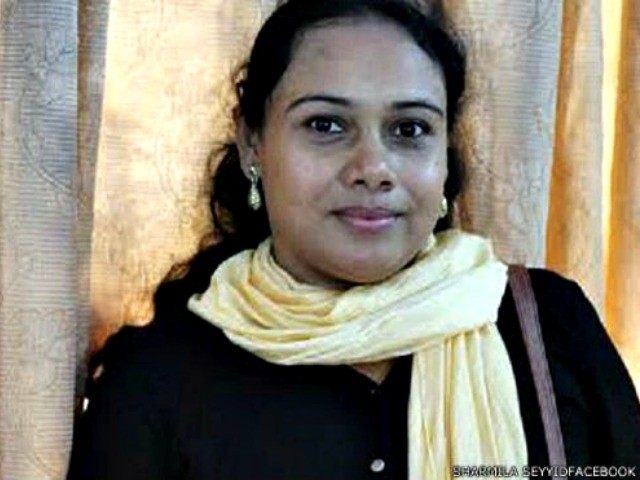Sharmila Seyyid, a Muslim woman journalist and human rights activist from Sri Lanka, received so much backlash from a comment in a BBC appearance that she left her home country. She did not receive a warm welcome in India, which forced her into hiding. Now outlets are pressuring both countries to protect Seyyid.
In 2012, she told the BBC “she backed legalizing sex work to help protect sex workers, while answering a question about her debut collection of poems Siragu Mulaitha Penn (Women With Wings).” One poem was about sex workers. That comment set off a firestorm in Sri Lanka. She received death threats, forcing her to flee with her small child. After she left, her sister received threats. The school she worked at was attacked and there was an attempt to burn it down.
More backlash followed with her novel Ummath, which “exposes the injustices meted out by Tamil nationalists to Tamil-speaking Muslims in Sri Lanka, but also critiques the Talibanisation of the Muslim community in eastern Sri Lanka.” People were upset that Seyyid questioned the need for purdah, which forces women to completely cover up so men cannot see them. She wrote:
Questions about covering a woman’s face… are crying out for clarity and resolution. It is not just a question of covering a woman’s face, (but) her whole body and the clothes and accessories that embellish it are shrouded over by force. Islamic society continues to not only force its womenfolk to stay in an environment that makes no concession to contemporary realities and the liberalising trends of the times but is in fact regressing into increasing rigidity. The stand taken by Islamic fundamentalists on issues such as women’s rights is often most condemnable and quite contrary to common sense and reason. The fundamentalists, appropriating for themselves the role of guardians of the society, have set up their own illegal panchayats, making it impossible to give reality to the dignity and the rights of women that the holy book, the Koran, has taught us…. The practice of wearing a head-dress and facial veil is an Arab custom and was brought to other countries as part of commercial ventures. Our dominating men have been successful in convincing women that these commercial products are a part of Islamic culture and tradition. Islamic women have, therefore, started wearing them as symbols of their identity and also because they fear that refusing to do so would stigmatise them as unchaste, anti-Islamic and even brand them as prostitutes!
Yet, she could not escape threats online. People posted pictures of her “alleging links with different sleazy crimes.” Others threatened her when she posted pictures of herself without her headscarf on Facebook. Authorities warned her not to post pictures of her being playful like a “mendicant in penance.”
Authorities also warned her to remove any pictures of her without purdah. They gave her 24 hours, but she refused to remove anything. Then someone posted “audio of a lewd conversation between a high-ranking Tamil Nadu police officer and a female subordinate” with a picture of Seyyid to make readers believe he was speaking with her. To make matters worse, the abusers then altered pictures of her to make it appear that she was raped and murdered. The pictures were so realistic her family thought she was dead.
The Muslim Civil Society addressed the issue in the Colombo Telegraph, which is run by exiled journalists who report on issues in Sri Lanka. In their statement, they “acknowledge that prostitution is prohibited in Islam (as in many other religions)” and understand people were offended by Seyyid’s comments. However, they also “categorically state that defaming, harassing and inciting violence against a person for holding a different opinion, in this case a woman, is unacceptable and not within the spirit of the faith, and can also be deemed a contravention of the law.” They continued:
This event highlights the critical need within the Muslim community, and also in the country at large, for developing processes to respond to critical issues, not through vilification, harassment or violence but through a process of dialogue that is in keeping with the law and norms of a democratic society and respectful of different faiths and ethics.
We urge the authorities to ensure that a thorough and fair investigation is conducted with regard to the complaints received by the aggrieved parties and hold those responsible for misconduct accountable. We also request that community religious leaders such as the Jamiathul Ulema take steps to halt the targeting of fellow Muslims based on spurious religious justifications. We also call upon all community leaders and civil society actors of the Muslim community to continue to play an active role in upholding the rights of every citizen.
57 activists, including lawyers and journalists, signed the statement.
The Sri Lanka Criminal Investigation Department “registered charges of cyber crimes against unknown persons.” Seyyid’s attacks are in Sri Lanka, India, and West Asia. Despite this, Seyyid and her son remain in hiding. Activists, though, are still speaking out for the woman. In Chennai, India, a group of women writers and liberal Muslims organized a discussion forum “to protest the continuing attacks on women by Islamic fundamentalists.”

COMMENTS
Please let us know if you're having issues with commenting.